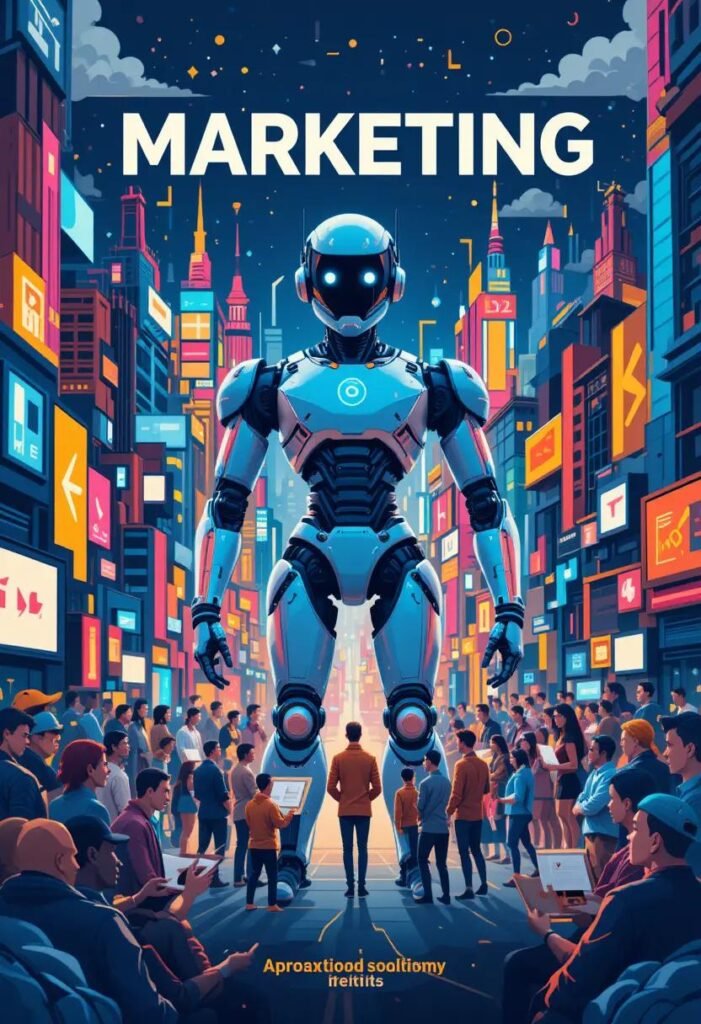Now Reading: 5 Proven AI-Powered Marketing Content Strategies
-
01
5 Proven AI-Powered Marketing Content Strategies

5 Proven AI-Powered Marketing Content Strategies
Introduction: Why AI Matters in Modern Marketing
Marketing today moves at lightning speed. Customers expect personalized experiences, businesses need efficiency, and competition is fierce. Traditional content creation often struggles to keep up — it’s time-consuming, resource-heavy, and sometimes fails to deliver ROI.
Enter AI-powered marketing content. Artificial intelligence has revolutionized how businesses plan, create, and distribute content. From writing blog posts to crafting personalized emails and analyzing performance, AI enables marketers to save valuable time while achieving stronger results.
But how exactly does AI fit into content marketing? And how can businesses leverage it without losing the human touch? Let’s break it down.
What Is AI-Powered Marketing Content?
Definition & Core Features
AI-powered marketing content refers to any marketing material — blogs, ads, social posts, videos, emails — created, optimized, or personalized using artificial intelligence. Instead of relying solely on manual writing or design, AI tools can:
- Generate text, captions, or ad copy.
- Analyze SEO opportunities.
- Optimize campaigns for engagement.
- Personalize messaging at scale.
How It Differs from Traditional Content Creation
Unlike traditional content creation, which relies heavily on time and manpower, AI automates much of the groundwork. Instead of brainstorming 50 email subject lines, AI can generate them instantly, leaving marketers free to focus on strategy and creativity.
Benefits of Using AI in Content Marketing
Saving Time & Boosting Productivity
AI drastically reduces the time needed for repetitive tasks:
- Writing blog outlines in seconds.
- Generating social captions.
- Creating automated ad variations.
This efficiency lets teams focus on strategy rather than busywork.

Scaling Personalized Marketing
AI allows hyper-personalization at scale. Instead of sending one generic email to thousands, AI can tailor subject lines, CTAs, and content for each recipient based on behavior and demographics.
Improving Content Performance with Data
AI analyzes performance metrics in real time, suggesting changes to improve results. For example, AI-driven SEO tools highlight keywords with high traffic potential, while predictive analytics forecast campaign success.
Top AI Tools for Marketing Content
AI Copywriting & Blog Tools
- Jasper – Generates blog posts, ads, and landing pages.
- Copy.ai – Quick social media and ad copy generation.
- Writesonic – AI-powered long-form and short-form content creation.
AI for Social Media & Ads
- Lately.ai – Creates social posts from long-form content.
- AdCreative.ai – Designs AI-powered ad creatives that convert.
- Hootsuite OwlyWriter AI – Generates captions and schedules posts.
AI for SEO & Analytics
- Surfer SEO – Optimizes blogs with keyword-rich content.
- MarketMuse – AI-driven topic clustering and SEO strategy.
- Clearscope – Improves readability and keyword density.
Practical Use Cases of AI in Marketing
AI in Email Campaigns
AI tools analyze open rates, suggest subject lines, and personalize content. For example, AI-powered email campaigns can recommend products based on past purchases, increasing conversions.
AI in Social Media Strategy
AI generates captions, schedules posts, and even suggests trending hashtags. Marketers save time while maintaining consistency across platforms.
AI in Long-Form Content & Blogging
From blog topic ideation to full drafts, AI helps writers speed up production. It also ensures SEO optimization by suggesting structure, keyword density, and readability improvements.
Balancing AI with Human Creativity
Where AI Excels
- Repetitive tasks (drafting, formatting, scheduling).
- Personalization at scale.
- Data-driven optimization.
Where Humans Still Lead
- Emotional storytelling.
- Brand voice consistency.
- Ethical judgment and cultural context.
The sweet spot is AI + human creativity, where machines handle efficiency, and humans bring the emotional depth that resonates with audiences.
Case Studies: AI Driving Marketing Results
- Coca-Cola leveraged AI to generate ad copy and creative variations, cutting campaign launch time in half.
- HubSpot uses AI in content recommendations, boosting engagement rates across blogs and email campaigns.
- eBay deployed AI-powered email marketing, generating millions of personalized subject lines and increasing CTR significantly.
Challenges & Ethical Considerations of AI Content
Risks of Over-Automation
Relying too heavily on AI can strip content of authenticity. Over-automated campaigns risk sounding robotic and generic.
Copyright & Authenticity Concerns
AI-generated content raises questions about ownership. Businesses must verify originality and avoid plagiarism.
Maintaining Brand Voice
AI can mimic tone, but it lacks true understanding. Without human oversight, brand messaging may drift off course.
Future of AI in Content Marketing
AI will continue to evolve, offering marketers smarter predictive analytics, conversational AI for customer interactions, and even AI-driven video production.
But one thing remains clear: businesses that adopt AI strategically will save time, improve ROI, and gain a competitive edge.
FAQs on AI-Powered Marketing Content
1. Can AI completely replace human marketers?
No. AI assists with efficiency, but humans are essential for creativity, strategy, and empathy.
2. What’s the best AI tool for content marketing?
It depends on your need. Jasper is great for blogs, while Surfer SEO is ideal for optimization.
3. How does AI save time in marketing?
By automating tasks like content drafts, ad variations, and email personalization.
4. Is AI content detectable by Google?
Yes, but when properly optimized and reviewed by humans, it performs well in rankings.
5. Is AI-powered content ethical?
Yes, as long as businesses use it responsibly, ensure originality, and maintain transparency.
6. What industries benefit most from AI marketing?
E-commerce, SaaS, healthcare, and financial services see the biggest gains from AI-driven personalization.
Conclusion: Unlocking the Power of AI in Marketing
AI is no longer a futuristic tool — it’s a necessity in modern marketing. From saving time on repetitive tasks to delivering hyper-personalized campaigns, AI-powered marketing content gives businesses a competitive advantage.
The future of marketing lies in striking the right balance: leveraging AI for speed and scale while using human creativity to deliver authentic, emotionally resonant stories. Businesses that master this balance will save time, improve ROI, and build stronger customer connections.
References
- HubSpot – How to Use AI in Marketing 👉 https://blog.hubspot.com/marketing/ai-in-marketing
- Forbes – The Role of AI in Content Marketing 👉 https://www.forbes.com/sites/forbesbusinesscouncil/2022/08/18/the-role-of-ai-in-content-marketing/
- Harvard Business Review – Artificial Intelligence for Marketing 👉 https://hbr.org/2018/01/artificial-intelligence-for-the-real-world
- Salesforce – AI Marketing Tools & Strategies 👉 https://www.salesforce.com/products/marketing-cloud/best-practices/ai-marketing/
- McKinsey – The State of AI in 2023 👉 https://www.mckinsey.com/capabilities/quantumblack/our-insights/the-state-of-ai-in-2023













Salma O'Reilly
hiI like your writing so much share we be in contact more approximately your article on AOL I need a specialist in this area to resolve my problem Maybe that is you Looking ahead to see you
Shashi M.
Thank you for your message — and I appreciate the kind words. I’m glad the content resonated with you. If you’re navigating a specific challenge related to the topic, I’m more than happy to be your strategic partner in getting it resolved.
Feel free to share the details of the issue you’re facing. Once I have clarity on the pain point, I can provide a targeted, high-impact solution that moves the needle for you.
Looking forward to supporting you.